In the annals of culinary history, there exist forgotten chapters of food that nourished generations long before the advent of fast food. These lost recipes were integral to Kerala’s culinary heritage, standing as testaments to sustainability, zero waste, and making the best of available resources. In today’s world, where sustainable practices are gaining importance, it is time to revive these forgotten foods from Kerala as a tribute to our rich culinary traditions and sustainable eating practices.
These forgotten dishes from Kerala are not merely recipes; they are woven into the cultural and historical fabric of the region. They reflect sustainable practices and resourcefulness passed down through generations. By reminiscing about these dishes, we not only honour Kerala's culinary traditions but also underscore the importance of sustainability in our food practices.
Kanji with Smoked Chutney: A Nostalgic Delight
Kanji, a simple rice porridge, is a staple in Kerala’s culinary heritage. Prepared by boiling rice in water until it achieves a thick, porridge-like consistency, Kanji retains the starch, helping sustain fullness for hours and providing the necessary energy for farm work or other physically demanding tasks.
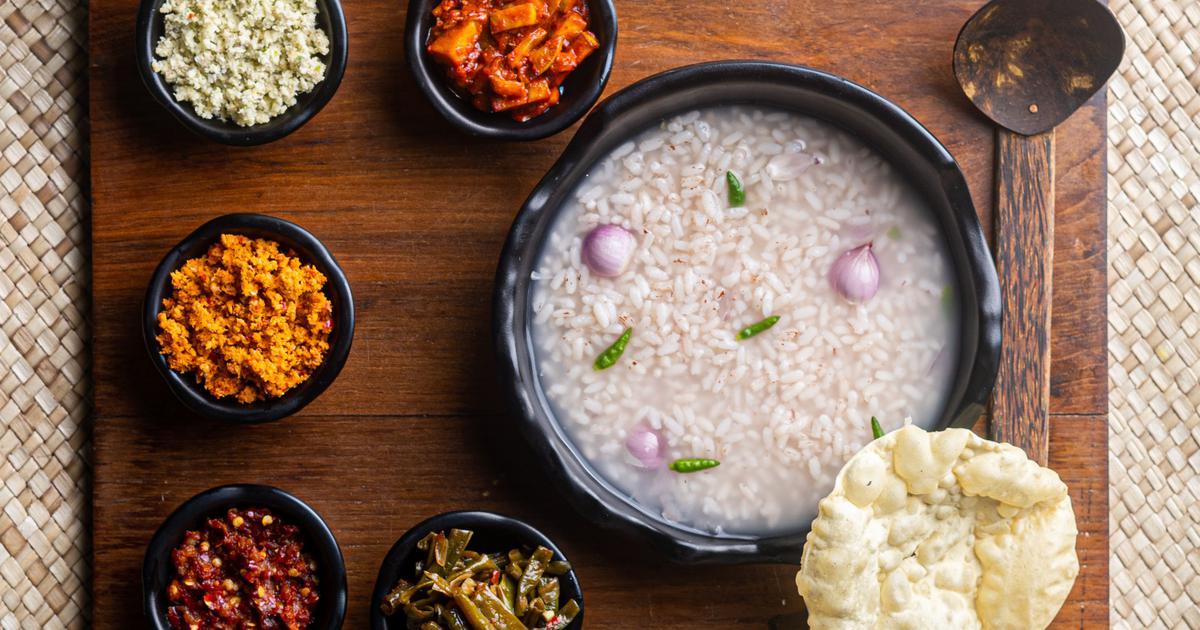
Kanji (Photo Courtesy: https://scroll.in/)
Kanji is often served with a variety of side dishes that elevate its humble flavors. One such accompaniment is smoked chutney made with chillies, ginger, and other local ingredients. The process involves burying the ingredients under firewood until well-smoked, then grinding them together with salt, tamarind, coconut, and shallots. The result is a robust and flavorful chutney that perfectly complements the mild taste of Kanji. The addition of fresh curry leaves and coconut oil enhances its authenticity, making it a cherished dish among locals.
Chakka Puzhukku: The Versatile One-Pot Meal
Chakka Puzhukku, a traditional dish made from jackfruit, exemplifies the sustainable use of local produce. This dish can also be prepared using other starchy vegetables like tapioca, and yam, or cereals like beans. The preparation involves boiling the main ingredient and then cooking it in the same water with coconut and chilies until it reaches a semi-gravy consistency. This one-pot meal is a staple in many Kerala households, often enjoyed in a communal setting, showcasing the region’s strong sense of community and shared meals.
The primary ingredient, whether jackfruit, tapioca, or yam, serves as a substitute for rice or wheat during the lean monsoon months, highlighting its role in sustainable eating.
The Smoky Flavor of Sardines
Sardines, rich in Omega-3 fatty acids, are a popular choice in Kerala’s coastal cuisine. The traditional method of smoking sardines involves using dried leaves or campfire smoke. This process not only preserves the fish but also imparts a unique, smoky flavor. Once smoked, the sardines are peeled and enjoyed with barbecued tapioca cooked over charcoal. This method showcases the ingenuity and resourcefulness of the local people, making the most of available resources while creating flavorful dishes.
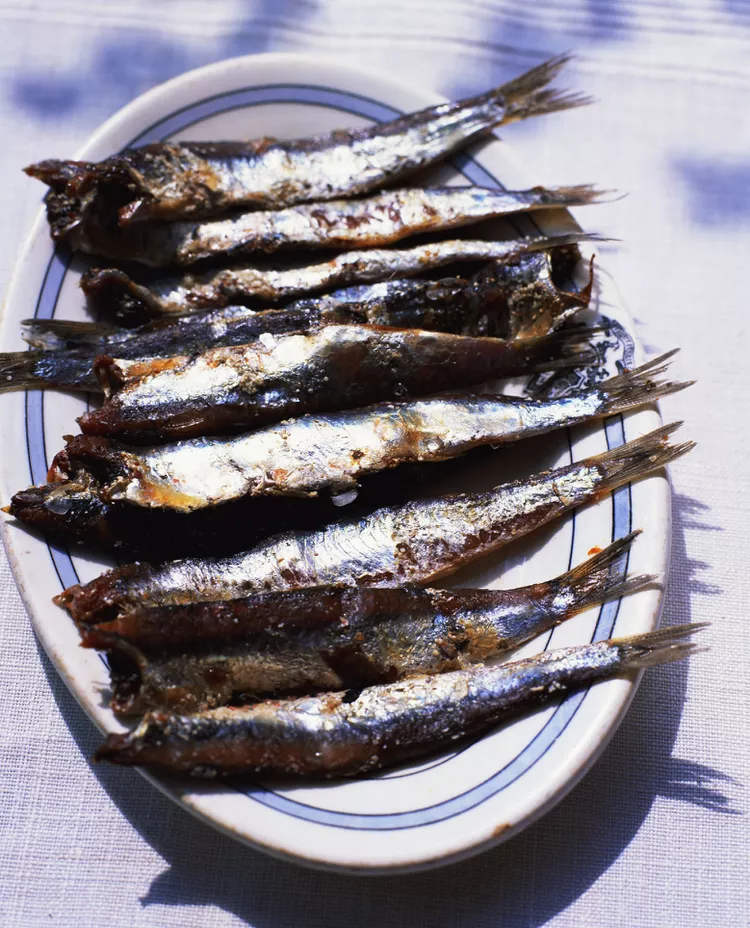
Kakka Pulli: A Taste of the Backwaters
Kakka Pulli is a unique soup-like curry made from mussel stock, combined with chillies, black pepper, and tamarind to create a tangy and spicy broth. This dish is a speciality of the backwaters of Kerala, particularly around Astamudi Lake in Kollam. The abundant supply of mussels in this region has made Kakka Pulli a favorite among locals. Traditionally served with rice, this dish allows the rich flavors of the mussels to shine through, highlighting the region’s abundant natural resources and culinary creativity.
Beef Ellu Curry: A Dish for Champions
Beef Ellu Curry is a dish that harks back to a time when meat was a luxury in many households. "Ellu" means bones, and this dish uses beef ribs cooked with onions, garlic, ginger, curry leaves, and coconut milk. When this delicious curry is mixed with tapioca, this becomes the Kappa Biriyani. The combination of beef ribs and tapioca makes this dish a hearty and satisfying meal.
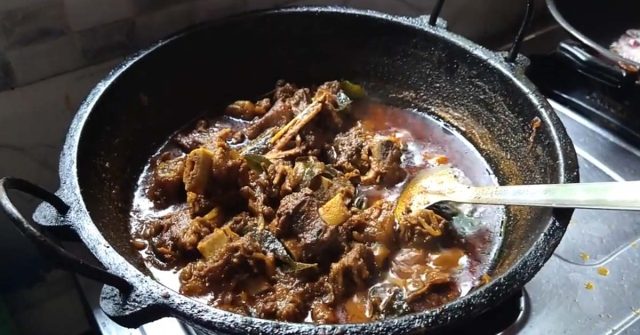
Ellu Curry (www.thattukada.net)
Raw Plantain Seasoned with Turmeric and Salt
In the past, raw plantains were often preferred over-ripened ones due to their longer shelf life and ease of storage straight from the tree. Boiled with turmeric and salt, this simple yet wholesome preparation preserved their natural flavor and nutritional benefits. This practice ensured food availability for longer periods and aligned with sustainable practices. By consuming fruits directly from the tree without artificial preservation methods, communities minimized food waste and reduced their ecological footprint.
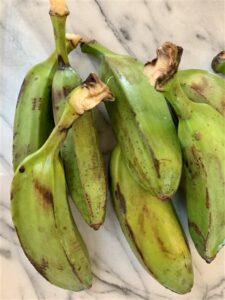
Accompanying this boiled raw plantain dish was a vibrant green chilli chutney, crafted from freshly ground green chillies, curry leaves, and shallots. This spicy condiment complemented the mild sweetness of the plantains and added a burst of flavors to the overall dining experience. To further enrich the meal, coconut flakes were often served as a side dish, adding texture and richness to balance the dish’s simplicity. This combination celebrated local flavors and traditions, satisfying hunger and honouring the region's culinary heritage.
Wild Yam Leaves Curry: A Monsoon Delight
In the lush greenery of Kerala, amidst the monsoon showers that nourish its fertile lands, a humble yet resourceful culinary tradition once thrived: wild yam leaf curry. In times of food scarcity, especially during the monsoon season, the people of Kerala turned to the abundant wild yam leaves growing naturally around them. This practice not only sustained them through lean times but also exemplified principles of sustainable living that resonate today.
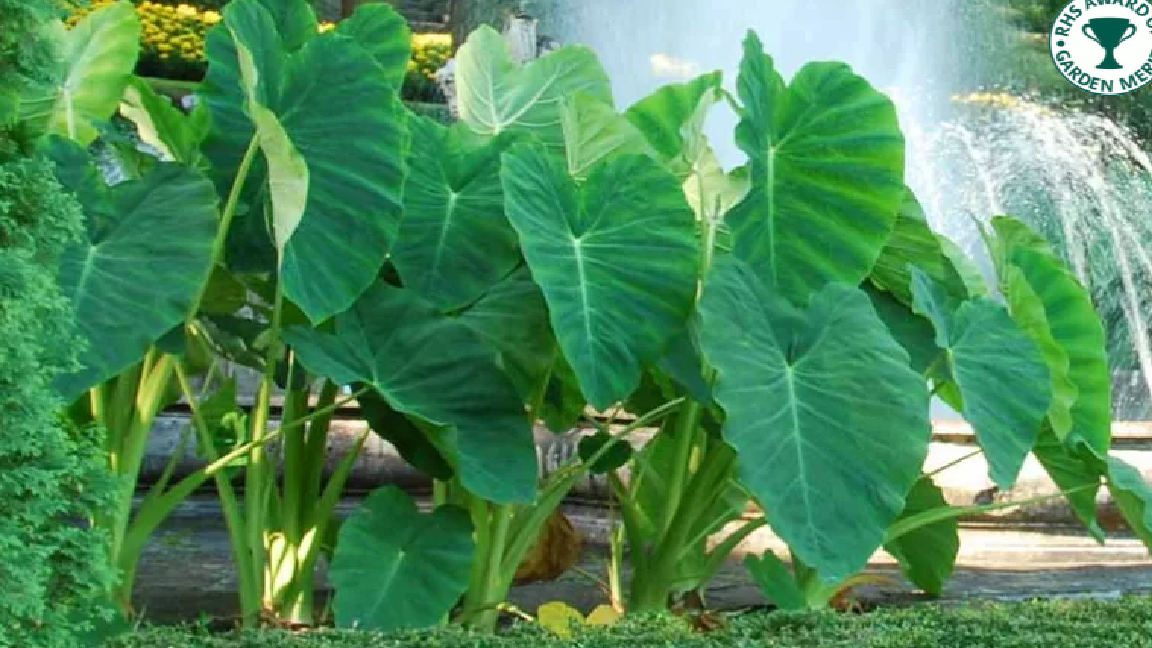
Wild Colocasia leaves, known locally as "Kattu Chembu," were harvested during the monsoon months when other crops were scarce. Rich in nutrients and readily available in the wild, these leaves provided a valuable source of sustenance. The preparation of wild colocasia leaf curry involved traditional cooking techniques passed down through generations. The leaves were carefully cleaned, chopped, and cooked with fried, grinded coconut and spices to enhance their flavor and nutritional value.
Today, as sustainability gains prominence in culinary practices worldwide, revisiting such traditional recipes offers valuable lessons. Embracing locally available produce, minimizing food waste, and using natural preservation methods can contribute to a more sustainable food system. By incorporating these principles into our diets, we honor our culinary heritage and contribute to a healthier planet for future generations.
The Importance of Sustainable Practices
The dishes highlighted in this blog are not only delicious but also exemplify the sustainable practices integral to Kerala's culinary heritage. From using locally sourced ingredients to employing traditional cooking methods that minimize waste, these recipes reflect a deep respect for the environment and the resources it provides. By revisiting these forgotten dishes, we can learn valuable lessons about sustainability and the importance of preserving our culinary traditions.
The forgotten dishes from Kerala are a testament to the region’s rich culinary heritage and sustainable practices. Kanji with smoked chutney, Chakka Puzhukku, smoked sardines, Kakka Pulli, Beef Ellu Curry, and raw plantain with turmeric and salt are more than just recipes; they are reflections of resourcefulness, creativity, and communal spirit that define Kerala’s cuisine. By remembering and celebrating these dishes, we not only honour the past but also pave the way for a more sustainable and flavorful future.

